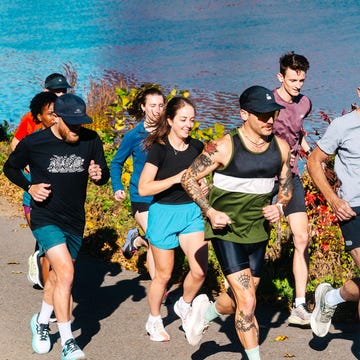My love affair with sports started with grade school basketball. I learned that sports could give me instant friends, teach us how to run plays as a unit, and that, as my coach’s T-shirt said, “There’s no I in Team.” We were all in it together against our rivals on the other side of the court.
Then I ran track. We had a team, but whether they won or lost had no bearing on whether I individually won or lost. The experience wasn’t as cohesive—I could tune in or out of my teammates’ events and I got out of it what I put in, unlike basketball, where sometimes I didn’t even go into the game. For a while I preferred the overt fun of the team sports, but stuck with running because I’d win a lot more than I’d lose, which I couldn’t really say about any other team I was ever on in school. (After my first season of cross country I eventually caught on to loving the sport for what it is.)
When I got to college and beyond, distance running team dynamics were still varied. There was more at stake, but it wasn’t always obvious what we were to each other. In cross country, we all wanted to help the team have a low score, but there was still an overall race going on. We talked, laughed, sweated, and worked alongside our training partners every day, but on the weekend we’d all see how we stacked up against each other.
That’s an interesting thing about our sport: You compete against the runners on your team or training group as much as you compete against all the other runners. How do you have the relaxed openness of a friendship but still beat someone who not only does all the same workouts you do but knows you well enough to spot your weaknesses? And is winning or losing to them going to make things...weird? Is competing against your friend kind of...mean?
Alone Together
We know the answers are “no,” that those questions sound almost childish. But when stakes of the wins and losses are high, the relationships involved can get complicated. This unique dynamic around competition and relationships isn’t limited to sports.
The dynamics of ambition and friendship on a team interest me even more as a woman. The stereotype of successful women not being able to work well together or of ambition being tied to “cattiness” and jealousy is by now almost a caricature. (That’s major progress! It means there are increased opportunities in women’s sports, which have led to less feelings of threat and scarcity regarding success. More of this please!) But the remnants of that outdated trope are still out there in ways like the occasional Queen Bee phenomenon, An Olympian’s Guide to Healthy Competition stigmas Queen Bee phenomenon.
Personally, although I’m super competitive, it’s through running that I’ve made a few sisterhoods outside the family that are as strong as the ones inside my family. I come from a family of all girls, including a twin sister, so maybe my mom imploring, “It’s nice to share!” over and over course-corrected my psyche for a life of thinking there’s enough for all of us. That’s not to say I don’t have blind spots and never envy anyone or never miss the mark on being wholly supportive, but I didn’t really identify with those cliches of icy lady bosses or jealous prom courts even when I saw them in such defining movies of my generation as Mean Girls (one of my favorites) or A Part of Hearst Digital Media.
We’re fortunate today to have examples of highly successful teams where the women support each other even as they rise over each other to ever higher levels of success. When they get beat, they level up consistently, rather than try to tear each other down. We've been shown it through social media with groups like the Bowerman Track Club or Team Boss. How to Start from Scratch With a Run/Walk Program record-breakingly well they’re performing.
Good Vibes
I’ve had some conversations with other elite women runners recently about how this vibe is maintained, and why it’s important.
One athlete noticed how good mentors set the expectation and live the example, which then gets passed down on a team. Another doesn’t deny that a unique dynamic does exist, that it’s not like a normal friendship because the element of working hard for the same win creates some friction. I think this is an important reality to acknowledge and normalize. Another athlete agrees with this take and added that, although it may or may not be a little harder to be friends, it’s possible with some extra conversations, it’s worth it, and that it’s something she wishes she did more often. Many women said that, at the end of the day, these relationships with their training partners and competitors are what is most rewarding about the sport.
One way I’ve seen women (myself included) work around this awkward dynamic is to take the Sasha Fierce approach to competitiveness and be someone different on the track than off it. For example, I’m not anyone who needs to feel in charge unless the gun has sounded, so maybe that complete lack of authority diverted me from some of the social Queen Bee-ing. Or maybe that was also the easiest way to compartmentalize being “nice and good” in life but feeling free to be an aggressive athlete as a female. (It’s interesting to note that Beyonce eventually Steps to Running a Great Time Trial, saying that she’s a grown woman and can be what she wants, including a ”messy amalgam of all her life experiences.”)
Another strategy is to acknowledge it’s possible to be happy for someone and still want better for yourself. Envy is just a human emotion, right? I see how it can be channeled in a constructive direction. It can be used as motivation, and is part of what we feel when we admire or respect someone, for example.
Competition Without Animosity
A solid piece of all around advice that especially applies here, and that was offered by many of the athletes I spoke to, is to avoid comparing yourself to someone else. Running is great because you can race the person next to you, as well as a version of your old self, the clock, the course, and the distance. So there are a variety of other metrics to measure your progress against.
A final tip for the purpose of sustainability would be to not race each other in every workout. Of course, we like to keep and be kept accountable for our quality of work at practice, and someone is always going to feel better than someone else, but it’s exhausting and hard to cooperate if egos are duking it out multiple times a week. Plus, race day is different from workout day. You hear of athletes who would crush some of their training partners on race day but may be barely hanging on to them in certain workouts, so you don’t need to prove yourself in every practice.
I remember years ago trying to emulate what I admired in the ladies I saw ahead of me, who were fierce on the track, but supportive and friendly off it. Today we have even more evolved examples of competitive female athletes who don’t have to check off saintly ideals to offset their savage skills on the field or track. Being competitive is seen more and more as an admirable trait for a woman to have these days, which is another good sign that I think in part has come from our female sports heroes.
At the end of the day, I know I don’t want to do this journey alone. Trying to summit your own peak potential in anything can be harrowing and isolating. It’s worth the occasional compromises and possible awkward patch to keep your friends and competitors close...because in this sport they’re often the same person!
It’s also a uniquely strong friendship when you can throw hard moves at each other on race day and have confidence you’ll be okay afterwards. Also, literally chasing down a big goal can be a singular experience, and here you are going through it together. Who can understand the frustrations and triumphs that go along with that any better?
I agree with many of the athletes I’ve talked to the last few months. Those relationships are special takeaways from our sport. Plus, once you’ve seen someone have to take a poo on the long run, you’ve entered max-level friendship territory anyway. There’s no turning back!

Molly Huddle is a two-time Olympian who holds the American record at 10,000 meters. She placed fourth at the 2018 New York City Marathon in a personal best of 2:26:44.















